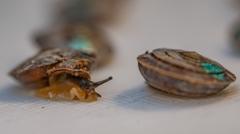In a remarkable conservation effort, a total of 1,329 tiny, critically endangered land snails have been released onto Bugio Island, a remote location in the Desertas Islands near Madeira. The initiative aims to reintroduce two previously thought extinct species of Desertas land snails, which had not been observed for over a century.
The journey toward this moment began when a small population was discovered clinging to survival on the cliffs of Deserta Grande between 2012 and 2017, prompting conservationists to intervene. They brought a small number of these snails into captivity at various zoos in the UK and France, including Chester Zoo, where a specialized habitat was crafted for them.
With habitat destruction caused by invasive species such as rats and goats, the original populations were critically threatened. Chester Zoo's conservation scientists successfully bred 1,329 offspring from the surviving snails, marking each with color-coded non-toxic dots for tracking as they were prepared for their return to the wild.
Dinarte Teixeira, a conservation biologist with Madeira's Institute for Nature Conservation and Forests, highlighted the usefulness of the markers, which will facilitate monitoring of the snails' growth, survival rates, and adaptation in their new home. The eradication of invasive species on Bugio has created a safe haven for these molluscs, essential for the island's ecosystem.
Gerardo Garcia from Chester Zoo remarked that the release represents a significant stride in the ongoing recovery efforts for these unique species, hinting at the potential for further releases if the initial reintroduction proves successful. The conservation team emphasized that these snails play a vital role in their ecosystem by decomposing organic matter and enriching soil nutrients, which supports the overall health of plant life on the islands.
Heather Prince from Chester Zoo emphasized the broader implications of the snails' reintroduction, noting their importance often goes overlooked in discussions about biodiversity. This initiative not only represents hope for the Desertas snail population but also underscores the critical need for sustained conservation efforts to preserve the delicate balance of nature.





















